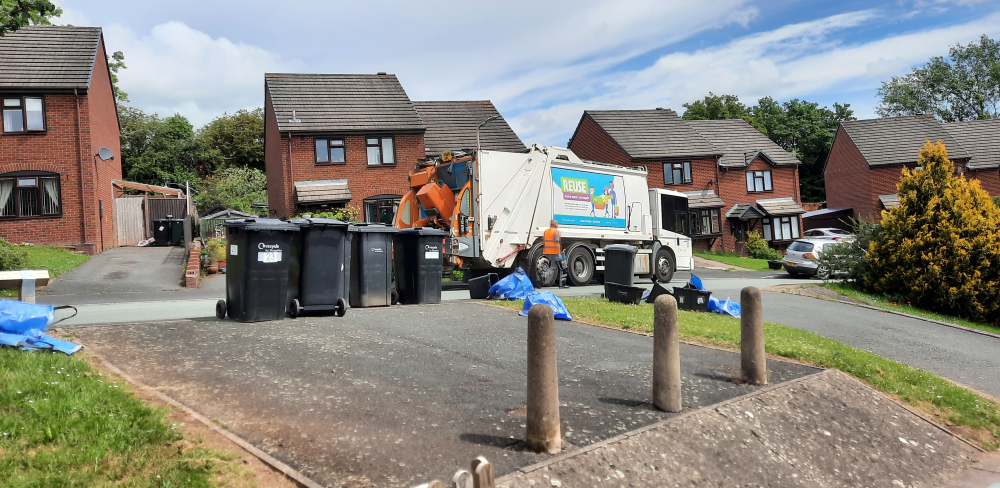In the Shropshire Star Ian Nellings, cabinet member for waste management, saidd: “I do want to make clear that we have no current plans to charge for garden waste collections.” The phrase “no current plans” has been well rehearsed by politicians through the ages and does not mean no future plans, or that plans are not being developed. And the possibility of changing for garden waste is mentioned a number of times in a paper to a recent meeting of the Place Overview Committee.
The paper did not ask the committee to back charges but after an intervention by Green Party leader Julian Dean, it refused to rule charges out.
Shropshire Council is strapped for cash. We should not be surprised if a proposal for charging for green waste is seen very soon.
I have already covered one aspect of the Place Overview Committee meeting, the ridiculous claim that the by-election in North Shropshire last December could have led to increased waste volumes. In this article, I focus on whether charging for green waste recycling works.
We already pay for bin collection and I don’t think we should be charged twice. Charging will also reduce recycling with more material being fly tipped or put in the black bin for incineration.
Councillor David Vasmer called for the committee to exclude any option of charging for green waste. His proposal was seconded by Roger Evans. Although the paper said: “A majority of authorities have introduced garden waste charges which has seen a reduction in overall garden waste being collected”, the motion was rejected after Green Party Councillor Julian Dean said that charging for green waste works, citing Stroud District Council as an example.
Dean was wrong and the evidence is that charges reduce the quantity of green waste collections.
The debate over charging for green waste comes as the council begins to develop a new Waste Minimisation Strategy. The Place Overview Committee was asked to approve two recommendations:
- support the development of a waste minimisation strategy for Shropshire
- support the creation of a waste minimisation team to deliver the strategy.
The plan is for two staff in the waste minimisation team at a cost of £93,000 a year, funded from existing budgets, and later from savings as waste is reduced. This was supported unanimously by the committee and is a move in right direction.
Shropshire has one of the highest quantities of waste per household in the country. In 2020/21, the average Shropshire resident generated 535kgs of kerbside collected waste and recycling, the second highest of the 348 local authorities in England and 138kg above the average. The aim of the waste minimisation strategy would be to reduce the amount of material that goes into the three bins, pink, green and black. That will save the council money and will help environmental objectives.
Household waste collection costs the council over £33.5m per year to collect and recycle and incinerate. That’s 6% of the council’s available budget. But households already pay for bin collection through council tax. I can see no reason for charging them twice for a service.
The case was made by Shropshire Council Green Party leader Julian Dean that the experience of Stroud District Council shows that charging for green waste works. Stroud doesn’t show that. If anything, it shows the opposite. I hope he will now correct the record.
Stroud introduced green recycling for households in 2016. It charged for collection from that point. There is no data to compare collection rates before and after charging.
Stroud generates much less green waste than Shropshire – 22% of its collection from households is for composting compared to 39% in Shropshire. Is this due to different characteristics between the two authorities? Not as far as I can see. Stroud is mostly rural but has more urban space than Shropshire. Private outside areas, gardens and yards, are slightly smaller than in Shropshire but nine in ten households have outside space, the same as here.
I think Julian Dean is wrong. Stroud does not show that charging for green waste recycling works. The evidence from Stroud is that charging for green waste does not work. We should not introduce charges in Shropshire. We should aim for being a top recycler like Stroud.
Notes
The data sources used for this article:
- ENV18 – Local authority collected waste
- WasteDataFlow
- Corine – land use
- ONS: Access to garden space.
Household calculations are based on the 2011 census.
This article uses data up to March 2021 and includes the first year of the pandemic when total waste in Shropshire increased in Shropshire by 10% and residual (black bin) waste volumes by 13%. This was due to people spending more time at home during lockdowns.
Around 2,000 tonnes of waste are collected from schools, nursing homes and hospitals and prisons (around 1% of the total). Currently this is classified as household waste but Shropshire Council hopes that a government review will class this as commercial waste, allowing the council to charge for it.


Would have been handy if Shropshire Council had not shut down Ludlow Tip.Saving appx £100k as i remember now they are about to spend a Similar amount telling us the Bill payer to throw less away.
Do you not collect garden waste and compost it to put on council gardens and ,maybe,get a surplus to sell to the public?
Do you not collect cardboard waste and sell it to paper making companies to make more paper?
Just thoughts to try to make recycling pay for council coffers.
Stafford Borough Council already charges for garden waste collection, it costs £36 per year and you get a sticker for your bin.
who owns and then recycles items which are deposited at the centers?
what profits are made by the company which recycle these items?